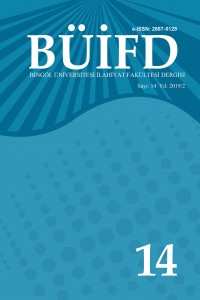Sık Kullanılan Edatlar Bağlamında Mehmet Akif Ersoy’un Mealinin Kur’ân Tercüme Tekniklerine Katkıları
Öz
Mehmet Akif
Ersoy’un Kur’an Tercüme Teknikleri Açısından Sık Kullanılan Edatların
Meallerine Katkıları
Murat SARIGÜL
Dr., Kafkas Üniversitesi, İlahiyat
Fakültesi, Tefsir Anabilim Dalı
Professor, Kafkas University, Faculty
of Theology, Department of Tafsır
Kars, Turkey
mrtsrgl24@hotmail.com
orcid.org/0000-0002-2576-6227
Öz
Türkçe ilk
Kur’ân tercümeleri, H.V/M.XI. yüzyıla kadar uzanmaktadır. XX. yüzyıldan
başlamak üzere basım yayın ve iletişim vasıtalarının gelişmesinin de tesiri
altında, meallerin sayısında zaman içerisinde bariz bir artış olduğu
gözlenmiştir. Bireysel teşebbüslerle yapılan meallerin yanı sıra resmi
kurumların öncülüğü neticesinde telif edilen mealler de olmuştur. Bunlar
içerisinde en çok bilinenlerin başında, T.B.M.M. inisiyatifi ile istiklâl şairi
Mehmet Akif Ersoy’a tevdi edilen meal çalışması gelmektedir. Türk Edebiyatına
vukûfiyeti ve yüksek beyan gücü bu güzide hizmetin ifâsında Akif’in tercih
edilmesinde etkili olmuştur.
Bu
makalede, Kur’an tercüme tekniklerinde özellikle Arapçadaki edatların bu meale
nasıl yansıtıldığı, otuza yakın mealle yapılacak bir kıyaslama yöntemi ile
ortaya konularak, Mehmet Akif’in meal çalışmalarına sağladığı katkı gösterilmeye
çalışılacaktır. Bu bağlamda son zamanlarda sayıları artan meallerde, Arapçadaki
edatların Türkçeye çevirisinde ne ölçüde bir yetkinlik ve çeşitlilik sunulduğuna
dikkat çekilecek, ayrıca vaaz, hutbe ve dînî yayınlarda sıkça kullanılan ayet
meallerindeki kimi eksikliklere temas edilerek, yer yer öneriler sunulacaktır.
Anahtar: Mehmet Akif Ersoy, Kur’an
Tercüme Teknikleri, Mealler, Edatlar, Gramer.
Contributions
of Mehmet Akif Ersoy to the Meanings of Frequently Used Prepositions In Terms
Of Qur'an Translation Techniques
Abstract
The
first Quranic translations in Turkish date back to the 19th century. Starting
from the 19th century, it was observed that there was a significant increase in
the number of translations over time, under the influence of the development of
printing and communication means. In addition to the works made with individual
undertakings, there have also been royalties due to the initiation of official
institutions. One of the most well-known among these is the meaning study,
which was handed over to the independence poet Mehmet Akif Ersoy by the Grand
National Assembly of Turkey. His insight in Turkish literature and high
expression power were effective in choosing Akif in the performance of this
distinguished service.
In this
article, in the Qur'an translation techniques, especially how the prepositions
in Arabic are reflected to this meaning will be put forward with a comparison
method that will be done in thirty meanings approximately and it will be tried
to show the contribution of Mehmet Akif to the meaning studies. In this
context, it will be pointed out to what extent competence and diversity has
been presented in the translation of the prepositions in Arabic into Turkish in
the increasing numbers of meanings recently. In addition, some deficiencies in
the meanings of verses that are frequently used in sermons and religious
publications will be touched upon and some suggestions will be presented.
Keywords: Mehmet Akif Ersoy, Qur'an
Translation Techniques, Meanings, Prepositions, Grammar.
Anahtar Kelimeler
Mehmet Akif Ersoy Kur’an Tercüme Teknikleri Mealler Edatlar Gramer
Kaynakça
- Atay, Falih Rıfkı, Çankaya, Ankara: Bateş Atatürk Dizisi, 1961.
- Cündioğlu, Dücâne, Bir Kur’an Şâiri, İstanbul: Kapı Yayınları, 2011.
- Dikici, Ali, İbadet Dilinin Türkçeleştirilmesi bağlamında Türkçe Ezan Denemesi ve Buna Gösterilen Tepkiler, Yakın Dönem Türkiye Araştırmaları, 10 (Ocak 2006) 77-104.
- Düzdağ, M. Ertuğrul, Mehmet Akif Ersoy’un Mısır Hayatı ve Kur’an Meâli, İstanbul: Şûle Yayınları, 2015.
- Edib, Eşref, Mehmed Âkif-Hayatı Eserleri ve Yetmiş Muharririn Yazıları, Haz. Fahrettin Gün, İstanbul: Beyan Yayınları, 2011.
- Ersoy, Mehmet Akif, Kur’ân Mealî, Haz. Recep Şentürk-Âsım Cüneyd Köksal, 1. baskı. İstanbul: Mahya Yayınları, 2012.
- Kadiroğlu, Abdülkerim ve Nuran, Mehmet Akif Ersoy’un Makaleleri, Ankara: Kültür Bakanlığı Yayınları, 1990.
- Tansel, F. Abdullah Mehmet Âkif Ersoy, 2. baskı. İstanbul: İrfan Yayınevi, 1973.
Ayrıntılar
| Birincil Dil | Türkçe |
|---|---|
| Konular | Din Araştırmaları |
| Bölüm | Makaleler |
| Yazarlar | |
| Yayımlanma Tarihi | 25 Aralık 2019 |
| Gönderilme Tarihi | 13 Eylül 2019 |
| Kabul Tarihi | 16 Aralık 2019 |
| Yayımlandığı Sayı | Yıl 2019 Sayı: 14 |





